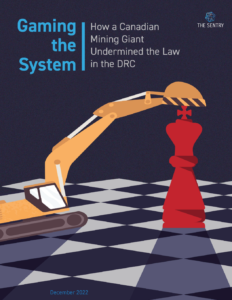 Read the full report and recommendations
Read the full report and recommendations
 Read the one page summary
Read the one page summary
> en français
Executive summary and key recommendations
The multibillion-dollar Canadian mining company Ivanhoe Mines Ltd. and its American-born founder Robert Friedland say they are on the cusp of industrial glory in the Democratic Republic of Congo (DRC).* * * * * Twenty-five years ago, Friedland’s company braved the uncertainties of civil war and the impending fall of a dictatorship to place a high-stakes bet on mineral exploration in the Central African Copperbelt. Now, after years of grit and tenacity, it boasts of a rare and prized asset—Africa’s largest-ever copper discovery, a project poised to become the world’s third-largest copper producer by 2024 and the second largest thereafter, with the highest grades of ore in the world.* * The passage of time has also delivered good fortune as Ivanhoe brings its product to market in a changing world: the transition away from the fossil fuel era and the enormous demand for renewable energy infrastructure it entails are due to send demand for copper skyrocketing.*
Along the way, however, there have been worrying signs that corruption may be present. Evidence reviewed by The Sentry shows that, in recent years, a top Ivanhoe executive arranged to share a potentially lucrative cut of local subsidiaries with a politically connected individual, doing so just as the Congolese government took apparently illegal actions that preserved the heart of what Ivanhoe now calls one of its “key assets.” This has allowed the publicly traded company to hold on to exploration licenses that, by law, it should have surrendered years ago, having apparently only recognized their value right before they were due to expire.
In effect, the company appears to have acquired the power to disregard domestic laws and regulations intended to maximize the value the Congolese people receive for the sale of their country’s mineral wealth, thereby helping entrench elite capture of the DRC’s natural resources and hampering the rule of law in one of the world’s poorest nations. Ivanhoe has since extensively promoted these assets on international stock markets and reportedly entertained at least one major partnership concerning them, prompting the question of whether the company sought to raise capital in the world of wealth and high finance by flouting Congolese law.
In the past, Ivanhoe has defended its dealings with Théophas Mahuku, an architect of the business holdings of Zoé Kabila, brother to former President Joseph Kabila, who was only two months from the end of his 18-year reign as the key events described here were unfolding. This report adds to Ivanhoe’s history of close cooperation with Mahuku, who has publicly vaunted his ability to solve his business partners’ problems by working his government connections.* There is reason to believe Ivanhoe’s practice of aligning itself with persons connected to powerful government figures may have continued into the post-Kabila era. Recent news reports show a close aide to President Félix Tshisekedi boasting on hidden camera of his personal business with Ivanhoe and offering to help other unnamed individuals route political contributions via contractors, among other things. No Ivanhoe employee appeared in the recordings, and when reached for comment, the company told reporters that it operated in the DRC according to stringent anticorruption policies. The advisor, Vidiye Tshimanga, has denied any wrongdoing.* *
All of this underscores the need for Ivanhoe to offer a compelling explanation for why Mahuku keeps cropping up at decisive regulatory junctures for the company and how it could legally have claimed many of the mineral rights it now holds. The available documentary record raises serious concerns of corruption but does not conclusively indicate that bribery took place. At a minimum, however, the circumstances described in this report show that the state apparently allowed a major outside player and a politically connected local business partner to sidestep the law.
Furthermore, these findings and the questions they raise are not wholly new ones for Ivanhoe. They arise against a backdrop of allegations of misconduct stretching back to the 1990s and over which Ivanhoe now seems to be facing mounting troubles. Though no charges have been announced, Canadian authorities have begun an anticorruption investigation into Ivanhoe Mines, carrying out a search last year of the company’s Vancouver, British Columbia, offices on suspicion of foreign bribery, according to Ivanhoe’s disclosures to investors.* Court documents indicate that police are scrutinizing the possibility of bribery in Ivanhoe’s relationship with the Congolese national power authority Société National d’Électricité (SNEL) and the Swiss hydropower engineering firm Stucky SA, now known as Gruner Stucky, a unit of the engineering services company Gruner that is upgrading colonial-era power stations on behalf of Ivanhoe.* Neither Gruner nor SNEL responded to The Sentry’s requests for comment. The Canadian investigation is not directly related to the matters discussed in this report but raises questions about a possible emerging pattern of behavior, further illustrating the need to broaden official inquiries into Ivanhoe’s conduct.
In response to The Sentry’s request for comment about the findings in this report, Ivanhoe Mines said its operations were subject to strict corporate anticorruption policies and internal controls and that any inference of corruption or malfeasance was “simply incorrect.” The company declined to offer detailed responses to most of The Sentry’s questions but said they concerned processes and procedures common to corporations operating across international borders over extended periods of time, adding “there are lawful, commercially reasonable and conventional explanations for these matters.”*
Key recommendations
- Ivanhoe Mines Ltd. should commission an independent and thorough internal investigation of the matters raised in this report, take all necessary measures to come into legal compliance where appropriate, and submit the results to relevant authorities; it should impose appropriate sanctions on any executive or staff member found to be in breach of legal or ethical obligations.
- The Congolese government should investigate the findings presented in this report and, if appropriate, initiate proceedings if Congolese criminal statutes or regulations have been violated.
- The Canadian and United States governments should review the findings presented in this report and open investigations into any potential violations of securities laws or criminal statutes.
- Financial institutions should review the transactions and payments executed on behalf of Ivanhoe and other companies mentioned in this report to identify any behavior that could form the basis of a suspicious transaction report to the local financial intelligence unit (FIU).
Read the report >

